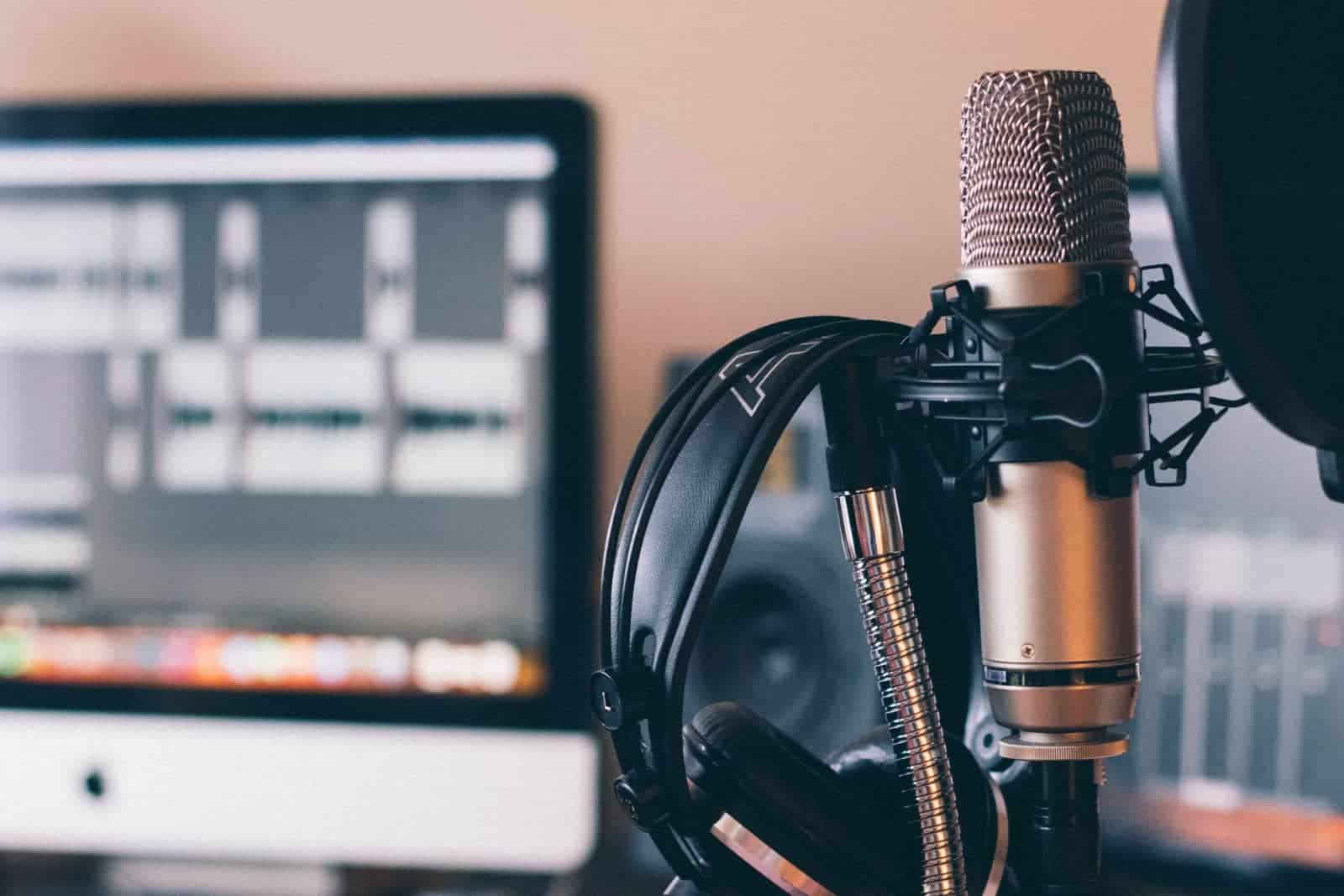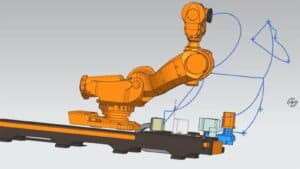
Selecting the best laptop for podcasting can be a daunting task, especially when there are countless models available in the market. As an avid podcast listener and aspiring podcaster myself, I understand the significance of having the right gear to produce high-quality content. In this laptop buying guide, we'll explore the essential features and specifications to consider when searching for the perfect podcasting laptop.
To bring you the best recommendations, I've reviewed an extensive laptop spreadsheet of recent releases, comparing specs and reviews from both professional and user-generated sources. I've narrowed down the top laptops based on specific requirements for podcasting, such as processing power, RAM, storage, and port selection, while also considering various price ranges. Whether you're recording solo, conducting interviews, or editing your episodes, the best laptop for podcast production should cater to your unique needs.
One of the key aspects to consider when choosing the best laptop for podcasting is the device's ability to handle multitasking, especially when it comes to audio editing software like Adobe Audition, Audacity, or GarageBand. A high-quality display and robust speakers are also valuable features for previewing video podcasts or monitoring audio levels. In addition, podcasters often require seamless connectivity for USB microphones, mixers, or audio interfaces, so having a variety of ports is essential. Keep these factors in mind as we delve into the world of podcasting laptops, helping you find the ideal fit for your creative endeavors.
Power up your podcasting with these processors
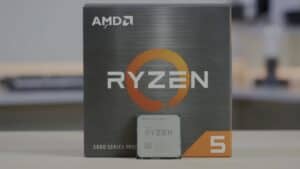
As a podcaster, your laptop is your most important tool, and choosing the right processor is crucial. Let's take a look at what's new in the laptop processor market and what you should consider when choosing the right one for your needs.
What's new in the laptop processor market?
Apple's ARM-based M1, M2, M2 Pro, and M2 Max system-on-chip modules have been gaining traction in the market with their exceptional single-core performance and battery life. AMD has captured 20% of the laptop CPU market, and there are plenty of notebooks with 6th-generation Ryzen CPUs. Recently, AMD has begun shipping the first batches of laptops equipped with its latest 7th-generation Ryzen processors. Intel's 13th-generation Core processors have already been released, but 12th-generation Core CPUs can still provide a lot of value, especially if you don't need cutting-edge performance.
How much CPU power do you need for podcasting?
While the CPU is important for audio processing, it's not as crucial as it was in the past. As long as you get a laptop with a recent processor from AMD or Intel with decent performance per watt, you'll be fine. For comparison purposes, I use Cinebench R23 to compare processors since it offers a good indication of single-core performance, which is vital for audio processing.
Are there any other considerations when choosing a processor?
If you're looking for a Windows laptop, I'd recommend going for H-series processors since they offer more power savings when working on battery, which is especially important if you're recording on the go. Ryzen models are best if you need a good battery life in a PC laptop.
How I rank processors by performance (benchmark scores)
If you want a fast laptop, look for one with an H-series processor. If you're on a budget, an U-series processor will do just fine. Here are my recommended processors for podcasting laptops by price range:
| Processor | Benchmark Score | Average Laptop Price |
|---|---|---|
| Minimum: i3-1115G4 | 1500 | $400 – $600 |
| Recommended: i5-1135G7 | 2000 | $700 – $1000 |
| High-end: i7-11370H | 2800 | $1200 – $2000 |
In conclusion, when it comes to choosing the right processor for podcasting, focus on getting a recent processor from AMD or Intel with decent performance per watt. If you're looking for a Windows laptop, go for H-series processors for better power savings when working on battery. And remember, while the CPU is important for audio processing, it's not as crucial as it was in the past.
Picture Perfect: Choosing a Graphics Card for Podcasting
If you're in the market for a laptop for podcasting, you may be wondering about the importance of a dedicated graphics card. Let's break it down.
First off, the laptop GPU market has seen some changes recently. Nvidia's RTX 40 series cards have been released, but the majority of laptops still use the RTX 30 series. Additionally, desktop GPUs have become much more power-hungry, widening the gap between laptop and desktop graphics performance.
However, for podcasting purposes, a dedicated graphics card is not necessary. Integrated graphics are more than enough for recording, editing, and encoding audio. If you're looking for a MacBook for podcasting, then you don't need to worry about the GPU at all – it's not even an option.
That being said, a GPU can speed up some tasks, such as video encoding or 3D rendering. If you're considering a Windows laptop with a discrete GPU, you don't need to go overboard with a high-end graphics card. A mid-range option such as the GeForce RTX 3050 would be more than sufficient.
Here are some recommended GPUs and their expected price ranges depending on the laptop price bracket:
| Laptop Price Bracket | Minimum | Recommended | High-end |
|---|---|---|---|
| Entry-level (<$600) | N/A | N/A | N/A |
| Mid-range ($600-$1000) | GeForce GTX 1650 ($150-$250) | GeForce RTX 3050 ($300-$500) | GeForce RTX 2060 ($600-$800) |
| High-end ($1000+) | GeForce GTX 1650 ($150-$250) | GeForce RTX 3050 ($300-$500) | GeForce RTX 2060 ($600-$800) |
When comparing different models of GPUs, I prefer to use GPU-Z for its user-friendly interface. If you're looking for a gaming laptop, it might be worth considering a model with an Nvidia Max-Q chip. These chips offer better performance while maintaining longer battery life than regular Nvidia chips; however, they do not deliver the same performance as their full-power counterparts.
In summary, a dedicated graphics card is not necessary for podcasting, but it can speed up some tasks. A mid-range option such as the GeForce RTX 3050 would be more than enough for most users, while those looking for high-end performance may want to consider the GeForce RTX 2060.
RAM-up Your Podcasting Game: How Much Memory Do You Need?
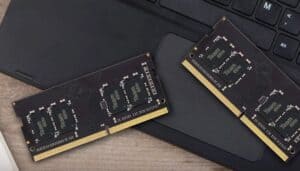
When it comes to podcasting, having the right amount and type of RAM in your laptop is crucial. Most mid-range laptops come with 16 GB of RAM, while high-end laptops may have 32 GB or more. However, podcasting is a memory-intensive task, and it's not uncommon to need 16 GB of RAM for a single machine just to keep multiple audio files in memory at the same time.
When shopping for a laptop for podcasting, it's important to consider not only how much RAM you need but also the speed of the RAM. DDR5 is the latest and greatest, but it's still quite expensive and not yet widely available. In fact, most laptops on the market today still use DDR4 memory. DDR5 will eventually become the standard, but it needs time to mature as a technology.
Aside from the amount and type of RAM, other specs to consider are latency, frequency, and CL timings. These factors can greatly affect the performance of your laptop. If you're looking for the best performance possible, look for a laptop with DDR5 or even DDR5X memory. However, keep in mind that these laptops will likely come with a higher price tag.
If you're on a budget, you may need to choose between a high-end CPU and a lot of RAM or a high-end GPU and less than 32 GB of RAM. It's important to prioritize your needs and budget accordingly.
In summary, for podcasting, we recommend a minimum of 16 GB of RAM, with 32 GB being the recommended amount for most users. If you're a power user, consider opting for 64 GB of RAM. Remember to consider other specs such as frequency and latency when making your purchase decision. While DDR5 is the latest and greatest, it's not yet necessary to have and comes at a higher cost.
Podcasting laptops: Clearing the air.
Q: What is the best laptop for podcasting?
It depends on your budget and specific needs, but for a medium-priced option, we recommend the MSI Summit E13. If you're looking for a high-end option, consider the MSI Titan GT77 12UHS-064.
What specs does a laptop need for podcasting?
For a smooth experience, we recommend at least an i5 processor, 16GB of RAM, and a dedicated graphics card, such as the GeForce GTX 1650. However, if you're doing more demanding tasks, like live streaming or video editing, consider going for a higher-end option with an i7 processor, 32GB or more of RAM, and a more powerful graphics card, like the GeForce RTX 3050.
Can you use any laptop for podcasting?
Technically, yes, but it's not recommended. Without sufficient specs, your laptop may struggle with running the necessary software and hardware for podcasting, leading to frustrating lag or performance issues.
How much RAM do you need for podcasting on a laptop?
At least 16GB of RAM is recommended for a seamless podcasting experience. However, if you plan on doing more demanding tasks simultaneously, like live streaming or editing video or audio, we suggest going for a laptop with 32GB or more of RAM.
What is the best processor for podcasting on a laptop?
For a minimum requirement, the i3-1115G4 should suffice. However, if you want a smoother experience, go for an i5-1135G7 or even an i7-11370H for more demanding tasks like live streaming or editing.
What is the best microphone for podcasting with a laptop?
There are many options available, but we recommend the Blue Yeti USB mic for its excellent quality and versatility.
What is the best recording software for podcasting on a laptop?
Again, there are many options available, but we recommend Audacity or GarageBand for their user-friendliness and robust features.
Can you record podcasts on a Chromebook laptop?
Yes, it's possible, but you'll need to use web-based recording software and ensure that your Chromebook has sufficient specs for smooth performance.
What are the minimum laptop requirements for podcasting?
At a minimum, we recommend a laptop with an i3-1115G4 processor, 16GB of RAM, and a dedicated graphics card, like the GeForce GTX 1650.
How to choose a laptop for podcasting?
Consider your budget, specific needs, and the recommended specs for podcasting. Look for laptops with at least an i5 processor, 16GB of RAM, and a dedicated graphics card. If you plan on doing more demanding tasks simultaneously, like live streaming or editing, go for a laptop with higher-end specs, like an i7 processor, 32GB or more of RAM, and a more powerful graphics card, like the GeForce RTX 3050. Also, don't forget to consider factors like microphone quality and recording software compatibility.
7 Best Laptops for podcasting
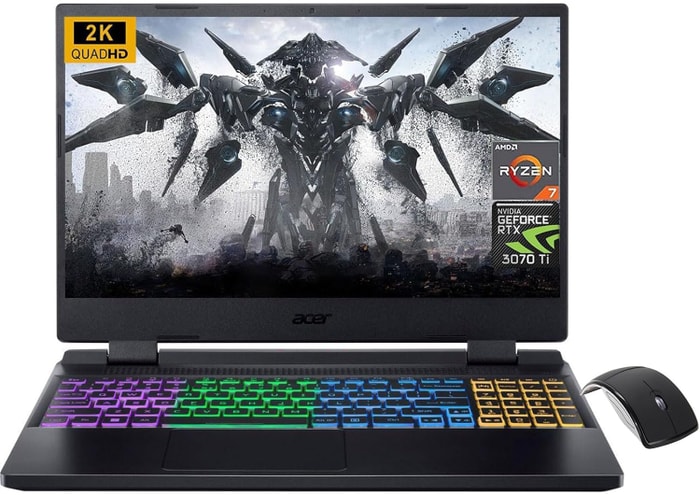 $680
$6801.acer Nitro 5
podcasting laptop- First-class processor (Ryzen 7 6800H)
- First-class graphics card (RTX 3070 Ti)
- Terrific display (15.6)
- One of most affordable laptops with an AMD Ryzen 7 processor
- Underwhelming memory amount (32GB)
- No IPS Panel (worse contrast)
Alternatives
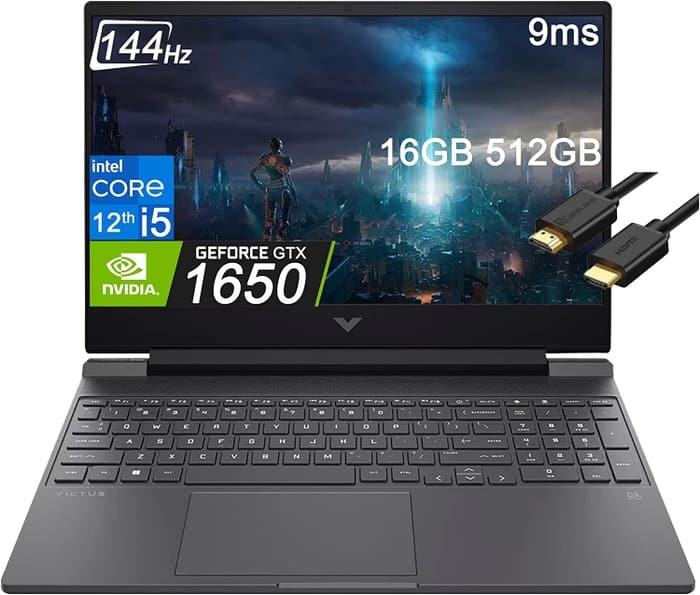
HP Victus 15t
- Low price
- Solid gaming performance
- Weak GPU yields unsatisfactory frame rates
- Mediocre display and webcam
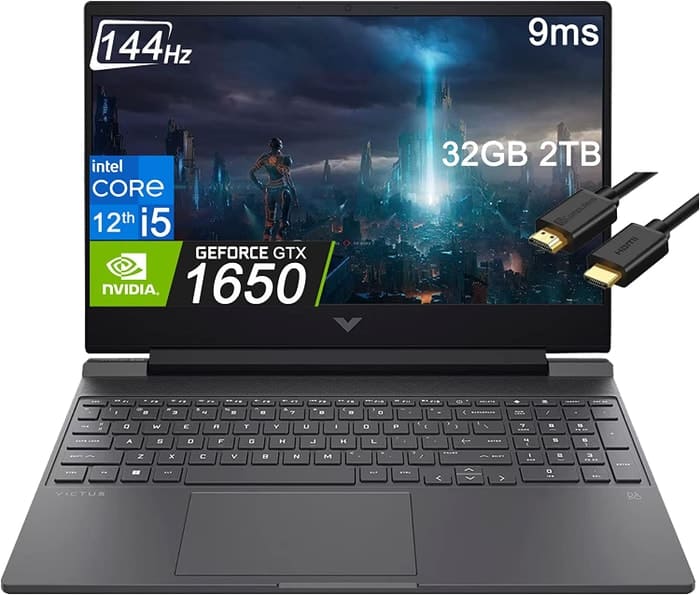
2.HP Victus 15
The HP Victus 15 offers impressive performance and affordability for budget-conscious podcasters, but falls short in battery life and design.- Excellent price
- Good gaming performance
- Solid array of ports
- Can double as a work laptop
- Bad battery life
- Rather plain design
- Weak GPU yields unsatisfactory frame rates
- Non-RGB keyboard with quirky nav controls
Summary
The HP Victus 15 is a budget gaming laptop that delivers excellent value for money, with respectable specs and the ability to handle graphically intense games and other routine tasks. While it may not have the most visually appealing design and suffers from subpar battery life, its performance and affordability make it a solid choice for podcasters on a budget.
Alternatives
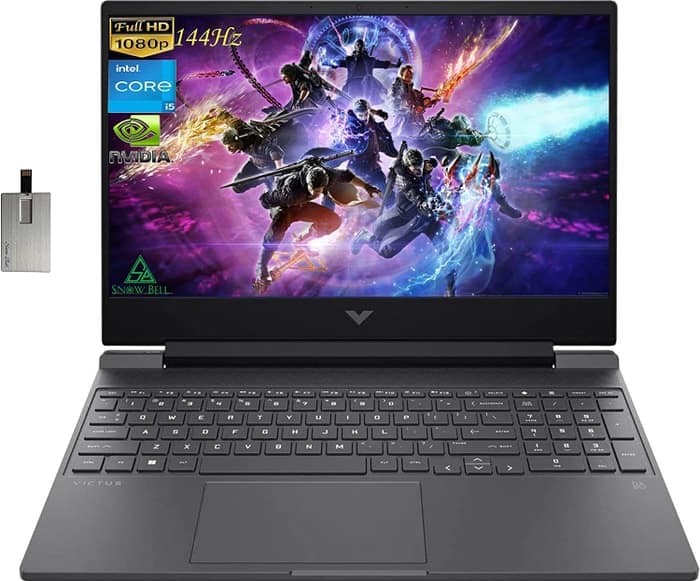
HP Victus
- Fast SSD.
- User-replaceable memory and storage.
- No variable refresh rate (VRR) to reduce screen tearing.
- Some performance loss on CPU under load.

3.ASUS TUF Dash F15
Affordable and powerful, the ASUS TUF Dash F15 is a solid option for podcasting on a budget.- Lightweight and well built
- Good performance for the price
- High-refresh-rate display options
- Decent battery life
- Some ergonomic quirks
- Ports squeezed together on the left edge
- FHD 144Hz panel option
Summary
The ASUS TUF Dash F15 is a lightweight and well-built laptop that offers good performance at a competitive price. With options for a high-refresh-rate display and decent battery life, it is a reliable choice for podcasting, although the FHD 144Hz panel should be avoided.
Reviews
Alternatives
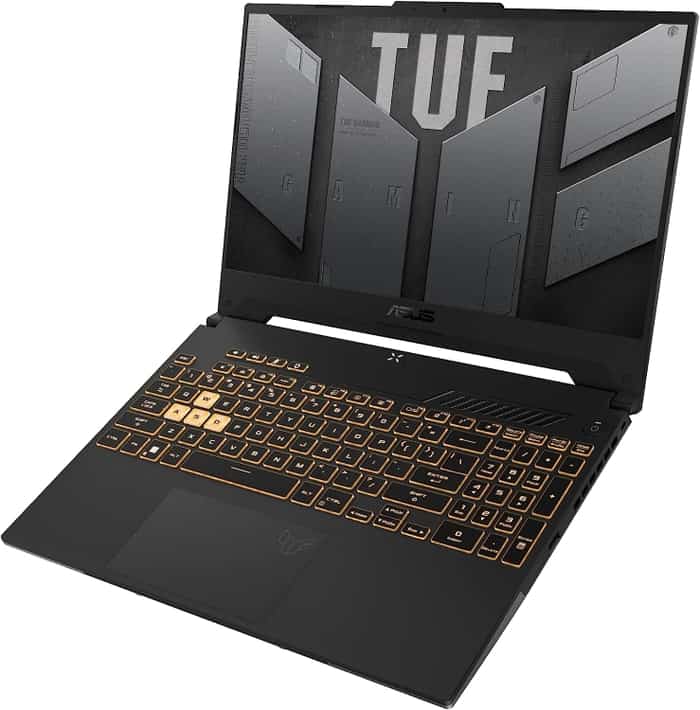
ASUS TUF F15 FX507VU-ES53
- Superb 1080p gaming performance
- Strong productivity capabilities
- Poor webcam, touchpad, and speakers
- Some games appear washed out on display

4.Lenovo Legion 5i Pro 16
Lenovo Legion 5i Pro 16: A sleek and powerful laptop for podcasting.- Stylish, sleek form factor
- Gorgeous display
- Strong performance
- Quiet fans
- Webcam quality is poor
- No biometric features
- SSD is slightly slower than competition
Summary
The Lenovo Legion 5i Pro 16 is a stylish and powerful laptop that offers excellent performance and a stunning display. It has plenty of ports and quiet fans, making it a great choice for podcasting. However, the webcam quality is not the best and it lacks biometric features.
Reviews
Alternatives
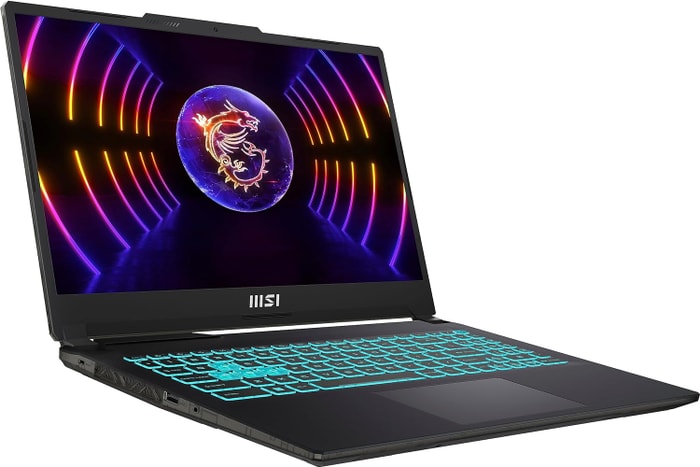 $1,430
$1,430MSI Cyborg 15
- Able to play at the highest 1080p settings
- Peppy processor for the money
- Display is dim and disappointing
- Sharp chassis edge can dig into wrists during typing
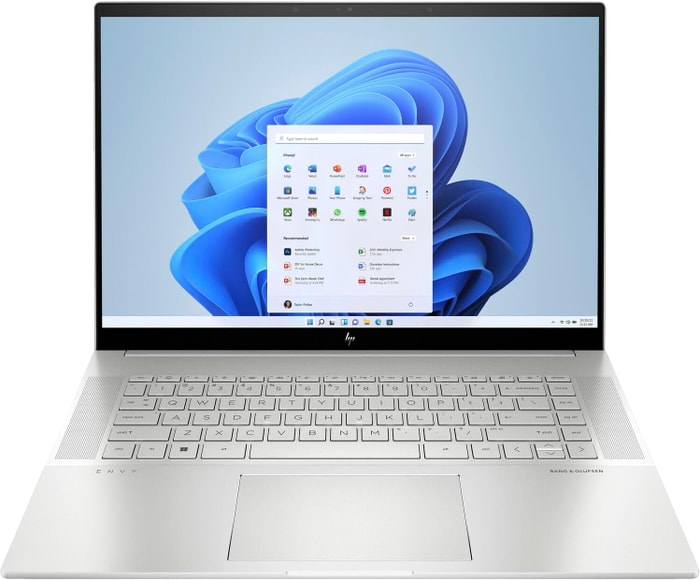 $1,800
$1,8005.HP Envy 16
HP Envy 16: A heavyweight contender for podcasting with high-end features and sleek design.- Plenty of CPU and GPU power
- New 120Hz screen refresh rate
- High-res webcam
- Sleek design
- Merely adequate base screen
- Optional OLED has fewer pixels than before
- Bulky and heavy
Summary
The HP Envy 16 offers a powerful CPU and GPU, a new 120Hz screen refresh rate, and a high-resolution webcam, making it a great choice for podcasting. However, it is let down by its merely adequate base screen, optional OLED with fewer pixels, and its bulky and heavy design.
Reviews
Alternatives

ASUS ROG Strix G15
- High-performance CPU and GPU
- Good workmanship and design
- Skimpy connectivity
- Coil whine in certain situations

6.Lenovo Legion Pro 7i 16
Lenovo Legion Pro 7i 16: A sleek and powerful laptop with impressive gaming performance at a reasonable price.- Strong overall performance
- Big, bright, and fast display
- Per-key RGB lighting
- Some flex to keyboard deck
- Poor battery life
Summary
The Lenovo Legion Pro 7i 16 is a stylish and unassuming gaming laptop that delivers powerful performance with its i9-13900HX processor and RTX 4090 graphics card. Despite its mid-range GPU limitations and poor battery life, it offers great value for its price, making it an attractive choice for gamers looking for an affordable option.
Alternatives
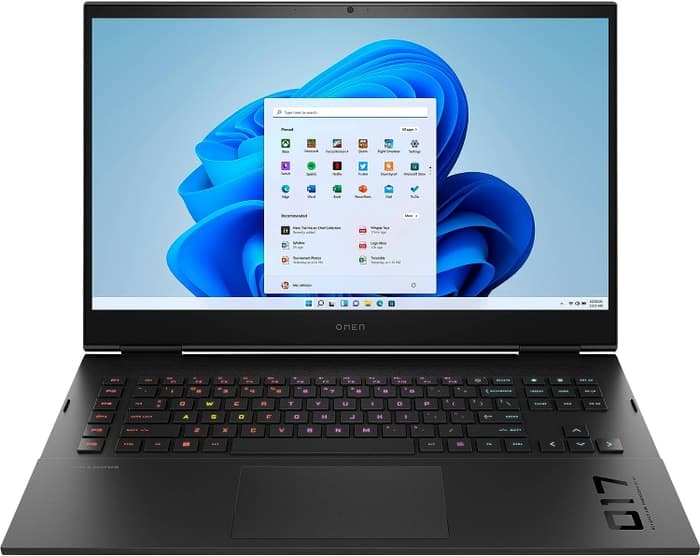
HP Omen
- Slim and portable build
- Midrange gaming performance
- All-AMD configuration falls behind competitors
- Unimpressive refresh rate and resolution

7.HP Omen 17
Powerful laptop for podcasting with impressive display and expandable memory, but falls short on performance and battery life.- QHD display with 165 Hz
- Expandable working memory
- Thunderbolt 4 with Power Delivery
- Individual key illumination
- Slightly below-average performance for a laptop with its specs
- High noise level
- Clattery case
- Meager battery life
Summary
The HP Omen 17 is a high-end gaming laptop that offers sufficient performance for podcasting tasks like video processing and rendering. It features a QHD display with a high refresh rate, expandable working memory, and Thunderbolt 4 connectivity. However, it falls slightly below average in terms of performance for a laptop with its specs and has a high noise level and short battery life.
Reviews
Alternatives
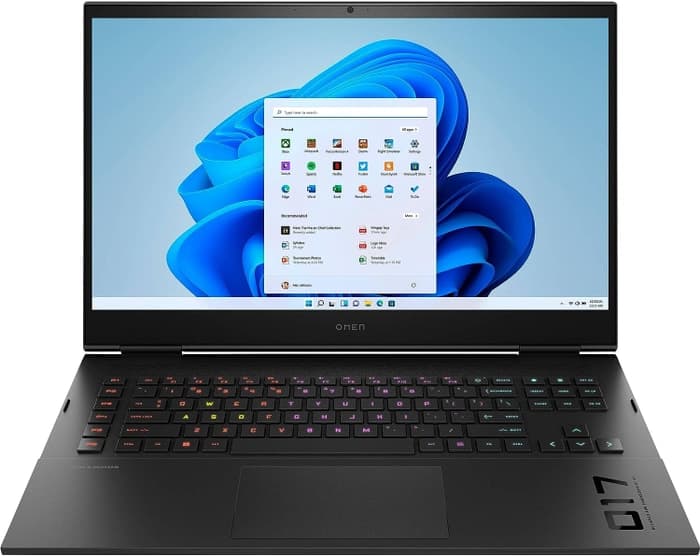
HP Omen
- QHD display with high refresh rate
- Powerful processor and graphics for multimedia tasks
- Slightly below-average performance for the graphics card
- High noise level
Table of the Best Laptops for podcasting
| Laptop | Price (approx) |
| acer Nitro 5 | $680 |
| HP Victus 15 | $880 |
| ASUS TUF Dash F15 | $1,160 |
| Lenovo Legion 5i Pro 16 | $1,300 |
| HP Envy 16 | $1,800 |
| Lenovo Legion Pro 7i 16 | $3,390 |
| HP Omen 17 | $4,290 |

